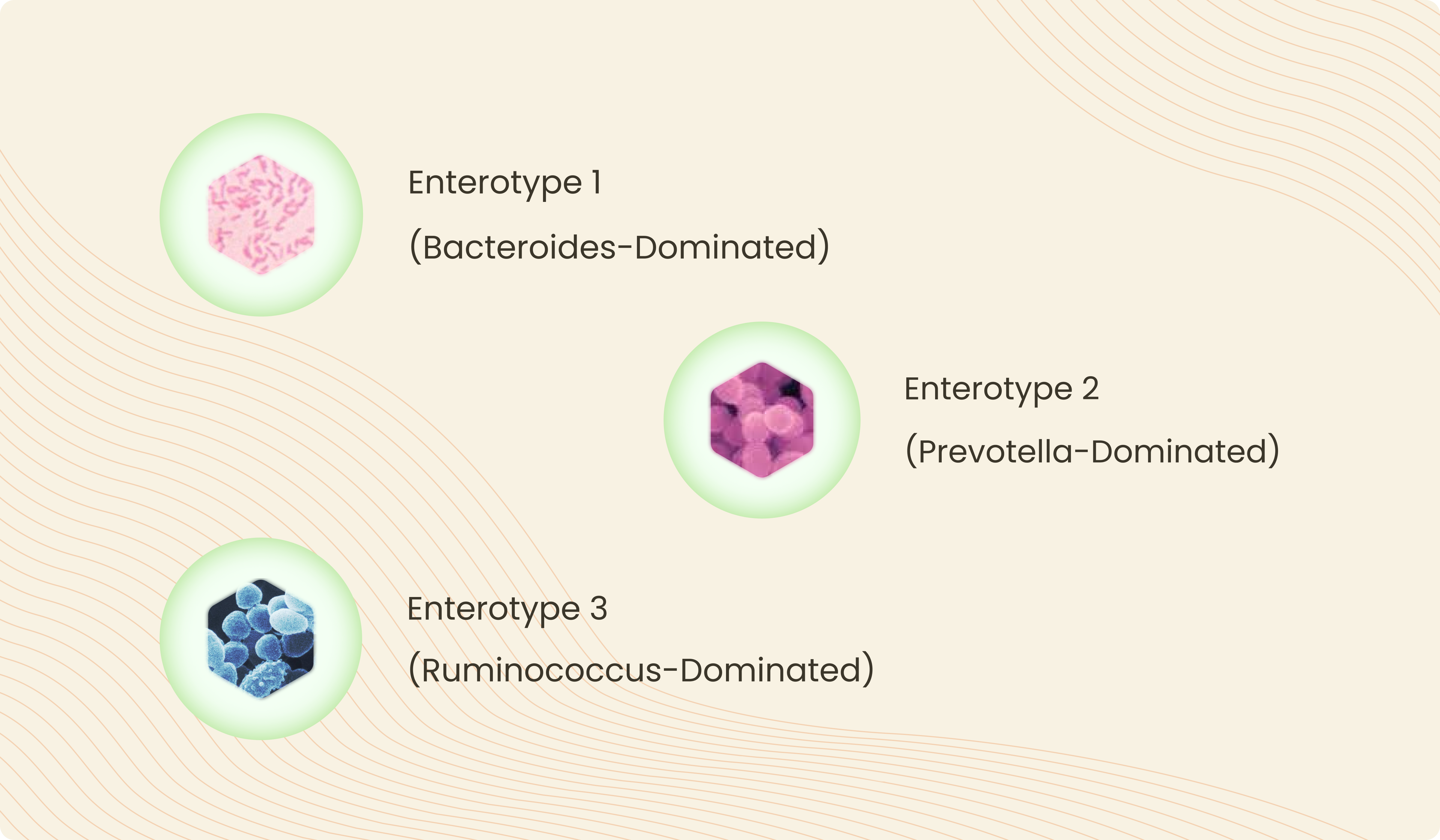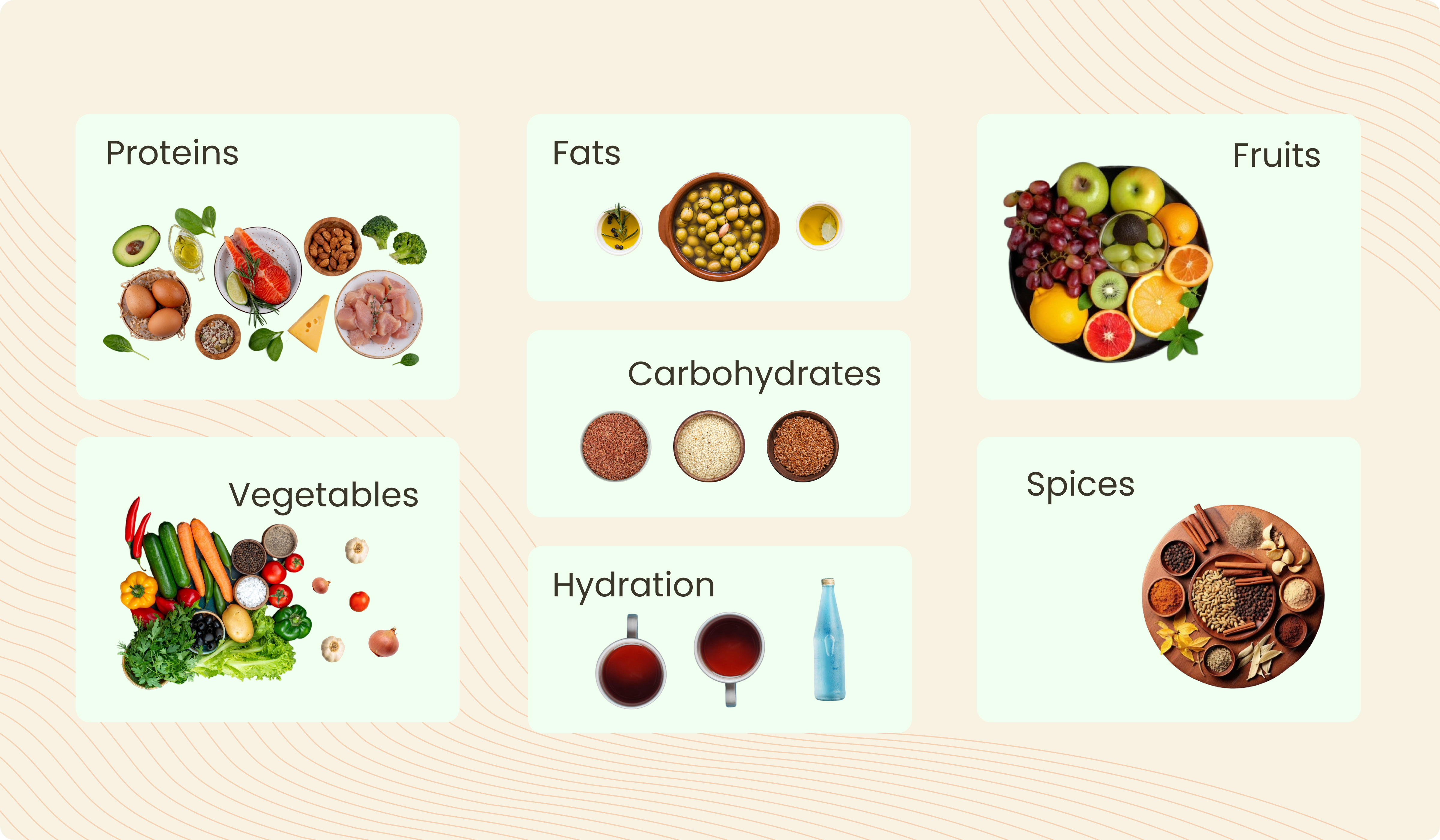Gut Microbiome Enterotypes

Gastro Wellness | Ayur AI
Dr. Prathiban R ,B.A.M.S., MSc,Ph.D
Updated on MAY 25,2024
In Ayurveda, the ancient Indian system of medicine, health and disease are understood in terms of the balance between the body's three doshas: Vata, Pitta, and Kapha. These doshas represent combinations of natural elements and govern physiological functions. Two key concepts in Ayurveda related to digestion and metabolism are Agni and Kostha. Agni refers to the digestive fire, responsible for the transformation and assimilation of food, while Kostha describes the nature of the gastrointestinal tract, ranging from hard (Krura) to soft (Mridu).

Types of Enterotypes


Modern research into the gut microbiome has identified distinct enterotypes, or classifications of gut microbiota composition, that resemble functional types. The three primary enterotypes are:
Enterotype 1 (Bacteroides-Dominated)
Characteristics: High levels of Bacteroides, associated with diets rich in protein and animal
fats.
Health Implications: Efficient in metabolizing proteins and fats, linked to metabolic conditions
like obesity and diabetes.
Enterotype 2 (Prevotella-Dominated)
Characteristics: High levels of Prevotella, associated with high-carbohydrate and fiber-rich
diets.
Health Implications: Efficient in fermenting carbohydrates, linked to inflammation and
conditions
like irritable bowel syndrome (IBS).
Enterotype 3 (Ruminococcus-Dominated)
Characteristics: High levels of Ruminococcus, often found in individuals consuming a mixed
diet.
Health Implications: Balanced metabolism, associated with stable digestive functions and overall
gut
health.

Diet Recommendations for Gut Microbiome Enterotypes


Enterotype 1 (Bacteroides-Dominated)
Characteristics: High levels of Bacteroides, associated with diets rich in protein and animal fats.
Diet Recommendations:
- Proteins: Lean meats (chicken), fish, eggs, and plant-based proteins like tofu and legumes.
- Fats: Healthy fats from avocados, nuts, seeds, and olive oil. Limit intake of saturated fats from red meat and dairy.
- Carbohydrates: Whole grains like quinoa, barley, and oats. Avoid refined carbohydrates and sugars.
- Vegetables: Non-starchy vegetables such as broccoli, spinach, kale, bell peppers, and zucchini.
- Fruits: Moderate intake of fruits like berries, apples, and pears.
- Spices: Incorporate moderate amounts of warming spices like ginger, cumin, and turmeric.
- Hydration: Drink plenty of water and herbal teas to support digestion.
Enterotype 2 (Prevotella-Dominated)
Characteristics: High levels of Prevotella, associated with high-carbohydrate and fiber-rich diets.
Diet Recommendations:
- Proteins: Light proteins such as lentils, beans, tofu, and white fish.
- Fats: Healthy fats from sources like flaxseeds, chia seeds, and walnuts.
- Carbohydrates: Emphasize high-fiber carbohydrates such as whole grains (brown rice, whole wheat, oats), legumes, and vegetables.
- Vegetables: A variety of fiber-rich vegetables including carrots, beets, sweet potatoes, and leafy greens.
- Fruits: Fruits high in fiber such as bananas, apples, pears, and berries.
- Spices: Gentle warming spices like cinnamon, cardamom, and fennel to aid digestion.
- Digestive Aids: Fermented foods like yogurt, kefir, sauerkraut, and kimchi to enhance gut health.
- Hydration: Warm water and herbal teas like peppermint and chamomile.
Enterotype 3 (Ruminococcus-Dominated)
Characteristics: High levels of Ruminococcus, often found in individuals consuming a mixed diet.
Diet Recommendations:
- Proteins: A variety of proteins including chicken, beans, lentils, and dairy products.
- Fats: Include healthy fats from sources like olive oil, avocados, nuts, and seeds.
- Carbohydrates: Whole grains such as brown rice, millet, and whole wheat. Include a moderate amount of carbohydrates.
- Vegetables: A wide range of vegetables to ensure a diverse gut microbiome. Include both starchy and non-starchy vegetables.
- Fruits: A variety of fruits to provide essential vitamins and minerals.
- Spices: Balanced use of spices such as cumin, coriander, turmeric, and ginger.
- Hydration: Sufficient water intake and herbal teas like ginger and fennel to support digestion.

Gut Microbiome Test Kit


To know your gut microbiome composition try BugSpeaks and get personalized diet recommendations with Aiwell

Conclusion

- Enterotype 1: Focus on lean proteins, healthy fats, whole grains, non-starchy vegetables, and moderate fruit intake. Avoid refined carbs and sugars.
- Enterotype 2: Emphasize high-fiber foods, light proteins, healthy fats, a variety of fiber-rich vegetables and fruits, and fermented foods.
- Enterotype 3: Maintain a balanced diet with a mix of proteins, healthy fats, whole grains, a variety of vegetables and fruits, and balanced use of spices.
References:
- PMC3728647
- PMC2930426
- PMC3368382
- PMC4318938
- PMC5385025




